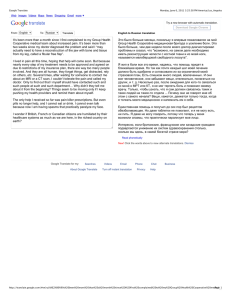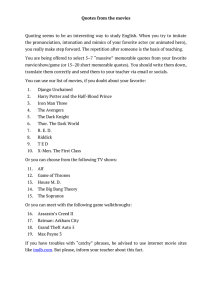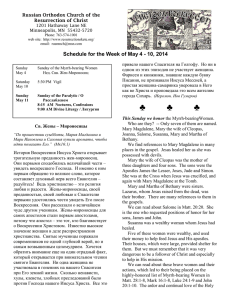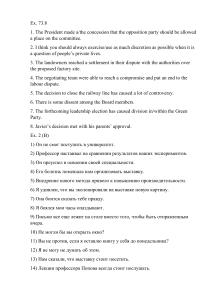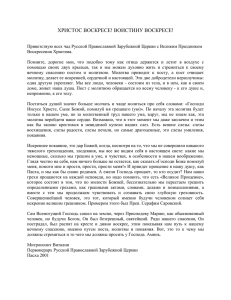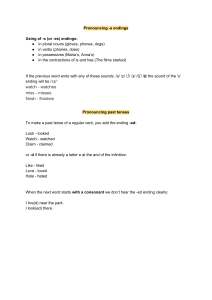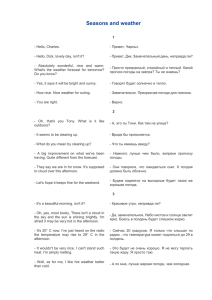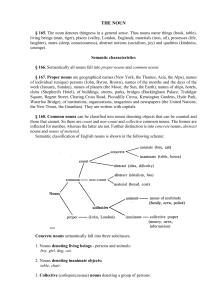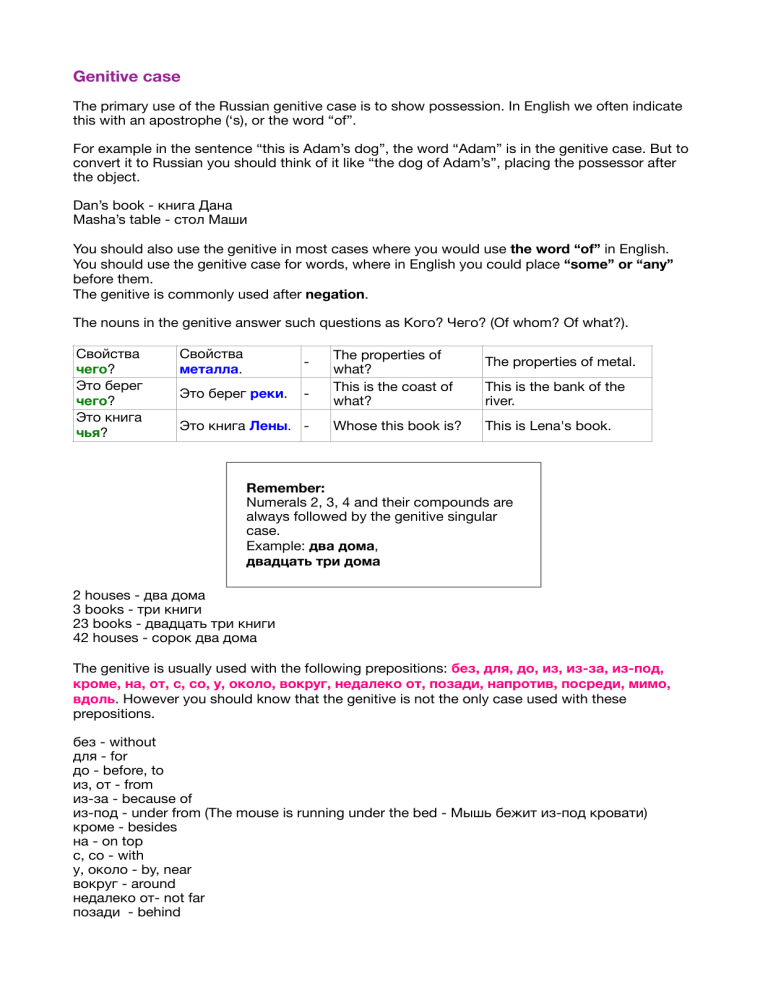
Genitive case The primary use of the Russian genitive case is to show possession. In English we often indicate this with an apostrophe (‘s), or the word “of”. For example in the sentence “this is Adam’s dog”, the word “Adam” is in the genitive case. But to convert it to Russian you should think of it like “the dog of Adam’s”, placing the possessor after the object. Dan’s book - книга Дана Masha’s table - стол Маши You should also use the genitive in most cases where you would use the word “of” in English. You should use the genitive case for words, where in English you could place “some” or “any” before them. The genitive is commonly used after negation. The nouns in the genitive answer such questions as Кого? Чего? (Of whom? Of what?). Свойства чего? Это берег чего? Это книга чья? Свойства металла. - Это берег реки. - Это книга Лены. - The properties of what? This is the coast of what? Whose this book is? The properties of metal. This is the bank of the river. This is Lena's book. Remember: Numerals 2, 3, 4 and their compounds are always followed by the genitive singular case. Example: два дома, двадцать три дома 2 houses - два дома 3 books - три книги 23 books - двадцать три книги 42 houses - сорок два дома The genitive is usually used with the following prepositions: без, для, до, из, из-за, из-под, кроме, на, от, с, со, у, около, вокруг, недалеко от, позади, напротив, посреди, мимо, вдоль. However you should know that the genitive is not the only case used with these prepositions. без - without для - for до - before, to из, от - from из-за - because of из-под - under from (The mouse is running under the bed - Мышь бежит из-под кровати) кроме - besides на - on top с, со - with у, около - by, near вокруг - around недалеко от- not far позади - behind напротив - infront посреди - in the middle мимо - by вдоль - along без воды without water для Вани for Vanya до окна to the window для чая for tea The genitive is used after the verbs просить, хотеть, требовать, искать, ждать, достигать, желать, бояться with nouns designating abstract and indefinite objects. For example: Учитель просит внимания. The teacher calls for attention. Розы боятся холода. The roses are afraid of cold. The genitive is also used after the words нет, не было, не будет. For example: У него не было денег. He did not have money. У меня нет брата. I do not have a brother. How to form the Genitive case Forming the genitive of Russian nouns is pretty easy. You will need to remove the last vowel from the nominative singular of a noun and add one of the following endings: -а, -я, -и, -ы (singular); -ов, -ев, -ей (plural). If the noun ends in a consonant, just add the appropriate ending. This process is summed up in the tables below. The Genitive of singular nouns Nominative Remove Add Genitive masculine брат чай -й а я брата чая neuter окно море о е а я окна моря feminine печь вода ь а и ы печи воды Explanation of the table: Add -а to masculine nouns ending in a hard consonant (брат) and neuter nouns ending in -o (окно). Add -я to masculine nouns ending in -й, -ь (чай, учитель) and neuter nouns ending in -е, -ие (море, орудие). Add -и to feminine nouns ending in -я, -ь (печь). Add -ы to feminine nouns ending in -a (вода). Exception 1: Because of the spelling rules, you should use the ending -и instead of -ы in feminine nouns ending in hard к, г, х or ж ш. For example: девочка - девочки, книга книги. Exception 2: Because of the spelling rules, you should use the ending -а instead of -я in masculine nouns ending in ч, щ. For example: ключ - ключа, товарищ - товарища. Exception 3: Maculine nouns ending а, я follow the same pattern as feminine nouns ending in а, я. For example: папа - папы. The Genitive of plural nouns Nominative singular Remove Add Genitive plural masculine мост брат край трамвай учитель --й й ь neuter окно море --- ов ьев ёв ев ей -й мостов братьев краёв трамваев учителей окон морей feminine печь коса стая ь --- ей --- печей кос стай Explanation of the table: Add -oв to masculine nouns ending in a consonant. Add -ев to masculine nouns ending in -й. Add -ёв to one-syllable nouns like край, чай. Exceptions are nouns like брат, лист which get the ending -ьев. Add -ей to feminine nouns ending in -ь and masculine nouns ending in -ь, ж, ч, ш, щ. Add -й to neuter nouns ending in -e. Neuter nouns ending in -o and feminine and masculine nouns ending in -а, -я lose their endings. Иностранный турист: Привет, парень! Ты можешь описать свой город? Я: Мой город - красивый, модный и шумный. Хошимин - крупнейший город во Вьетнаме. ИТ: А что в твоём городе есть? Что популярно в твоем городе? Я: В моем городе большие высокие здания, красивые большие улицы и много мотоциклов, развлечений, таких как (such as) кино, театры, рестораны, бары. ИТ: Я знаю, что вьетнамцы дружелюбные, а девушки красивые? Я: Да, это так / да, это правда. Но, я думаю, что иногда ты можешь встретить плохих людей. А у вьетнамских девушек азиатская естественная красота. ИТ: Я люблю твой город, потому что он красивый и чудный. А ты? Я: Я тоже люблю мой город, но иногда я не люблю его, потому что у нас много коррупции. ИТ: Я всё понял, что ты сказал. Спасибо! Я: Пожалуйста! Моё сердце: Ты любишь себя? Я: Это трудный вопрос. Я думаю, что я мало люблю себя, я чувствую себя робко и эгоистично. Мне кажется (it seems to me, I think) иногда, что я плохой человек. МС: Почему ты так думаешь / почему ты так себя чувствуешь? Я: Во-первых, я робкий человек. Я встретил интересного хорошего человека. Он помог мне многократно, но я не могу выразить ему благодарность. Я не чувствую себя храбро и ответственно. В классе у меня не много друзей, потому что я робкий и молчаливый. Я обычно чувствую себя одиноко и скучно. Я не знаю, как изменить себя. Во-вторых, я эгоистичный, я обычно не люблю делиться моими вещами с кем-нибудь. Я злюсь, когда кто-то берёт или занимает мои вещи. Меня это убивает и я чувствую давление. В-третьих, я плохой человек, иногда я много вру, я не чувствую себя счастливым в своём доме. Мои родители, не проводят время со мной, хотя они обеспечивают меня всем необходимым (деньги, телефоны, компьютеры). Но я это не люблю, я хочу любви. МС: Что ты будешь теперь делать? Я: Я обычно пишу эти вещи в тетради. Я могу говорить об этом только с незнакомцами. МС: Храбро! Ты можешь изменить себя! Не сдавайся! Я: Я верю, что я могу, я ещё молод. Я чувствую себя плохо. Я чувствую себя хорошо. Как ты себя чувствуешь? Как вы себя чувствуете? Как он себя чувствует? Someone is somewhere - where? - где? - Prepositional Someone is going somewhere - where to? куда? - Accusative Someone is coming from somewhere - where from? - откуда? - Genitive

